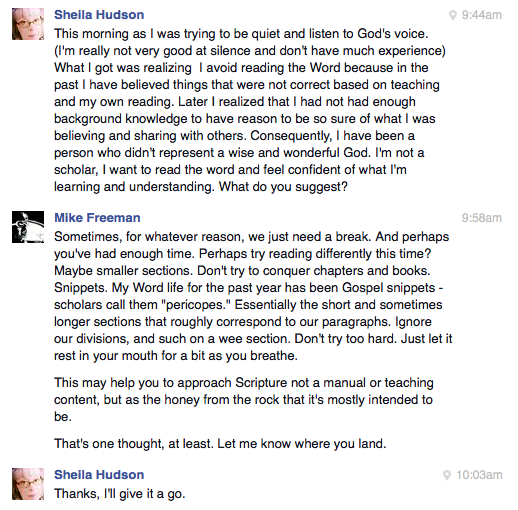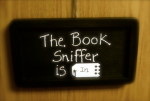Let us dare to
read,
think,
speak, and
write.
Let every order and degree among people
rouse their attention and
animate their resolution.
Let them all become attentive
to the grounds and principles of government,
ecclesiastical and civil.
Let us
study the law of nature;
search into the spirit of the constitution;
read the histories of ancient sages;
contemplate the great examples of Greece and Rome;
set before us the conduct of our own ancestors,
who have defended for us
the inherent rights of mankind against
foreign and domestic
tyrants and usurpers, against
arbitrary kings and
cruel priests,
in short, against the gates of earth
and hell.
Let us
read and
recollect and
impress upon our souls
the views and
ends of our own more immediate forefathers,
in exchanging their native country
for a dreary, inhospitable wilderness.
~ John Adams
One of my favorite quotes. Ever. It’s more than a government class motto or a patriot’s challenge.
It strikes me as a lifelong charge in the same landscape as Paul’s “Prove all things. Hold on to what proves good; toss the rest.” (Mike’s Authorized Version there)
I love the fire flowing through Adam’s words!
Adams chooses four key action words:
Read
Think
Speak
Write
The order here is crucial.
Many of us have no trouble with being bold to speak or write. We blurt things out all the time. “The fool utters all that is in his heart; the wise have the wisdom to show restraint.” Perhaps the greater daring for us is knowing how to be silent and truly listen more frequently. The same goes with writing. How quickly we can slap things on Facebook walls and post on our blogs. Reticence is a bit of a lost art. Sometimes, we let just a bit too much “hang out,” perhaps.
 And many of us also have no trouble thinking either (or so we like to think). We have a multitude of opinions at the ready. Thinking about thinking, I find myself wondering what Adams would think about “Let us dare…to feel.” Answer: probably not much, considering his evaluation of poets: “Poets read history to collect flowers, not fruit; they attend to fanciful images, not the effects of social institutions.” And yet the same Adams wrote, “A man is never alone who has a poet in his pocket.”
And many of us also have no trouble thinking either (or so we like to think). We have a multitude of opinions at the ready. Thinking about thinking, I find myself wondering what Adams would think about “Let us dare…to feel.” Answer: probably not much, considering his evaluation of poets: “Poets read history to collect flowers, not fruit; they attend to fanciful images, not the effects of social institutions.” And yet the same Adams wrote, “A man is never alone who has a poet in his pocket.”
But we are awash in feelings, aren’t we? No shortages of emoticons, effervescent expressions and outbursts with expletives thrown in at no additional charge – even though, ironically, so few of us, I feel, are in touch with the deeper subterranean ebbings and flowings of our feelings. Daring to truly feel is, IMHE (in my humble estimation) just as imperative a need as daring to truly think.
It is the reading that is so pivotal in this sequence, for me. Without generous, wide, and wise input from the

I so need one of these. yes, need.
minds and thoughts of others we are left only with our own – and that can be a lonely, hollow space.
I love the dimensions of Adams’ reading. From ancient to modern, from Greek to Roman to European to American cultures; ancient sages to more immediate forefathers. Most of us, if we read, read far too narrowly. If we are religious, we read that narrow band of religious books that agrees with and confirms where we are; if we are irreligious we do the same. We read the books already bending in our direction. This is only natural. But how incredibly boring. Some well-meaning souls won’t read anything that isn’t heavily threaded with Scripture. Yet writers of Scripture used as their sources the non-canonical records of kings, ancient lore such as the Book of Yashar that is otherwise unknown to us, the Apostle finds truth in Athenian poets and Cretan prophets – while another quotes from Apocryphal books that Protestants ban from Holy Writ.

pick one
It’s just a thought, and this is really the point of this post, I think. The wider and deeper the reading, the richer the thought (and feeling!), the more inspired the speech, the more helpful and healing the writing.
Christ is sown wide in the world. From the mouths of infants he still ordains praise, and truth can still be heard in the braying of an ass (my personal, constant encouragement). And so in addition to a daily dipping into ancient Hebrew and Greek texts, I dip regularly into C.S. Lewis, into Merton’s musings, Rohr’s contemplations, Rilke’s lyrics, Rumi’s envisionings, and Kushner’s rabbinic wisdom. Such diversity of culture, time, language, religion – and yet how they track. Truth is truth, no matter who speaks it, many voices – Jewish, Muslim, Catholic, Protestant, agnostic and atheist – forming one chorus, pronouncing his unpronounceable name, whether they know and want to or not, if we will but listen. Solo performances can be spell-binding – but, oh, the power of a mighty chorus.

oldies are goodies
So please. I dare you.
Take and read.
And the rest will follow…
* oh, and sapere aude? Latin. Dare to know. Dare you. I dare me.
























